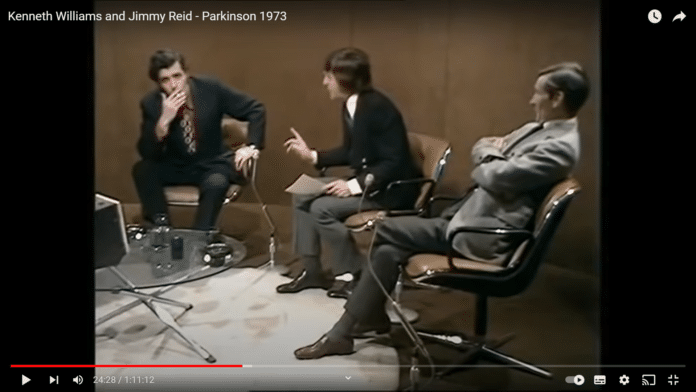In early 1973, Kenneth Williams was a guest on the Parkinson Show, with actress Maggie Smith and Poet Laureate Sir John Betjeman. He became involved in a heated exchange with Michael Parkinson over the conduct of the trade union movement, and social and political ideologies more generally. Although by today’s standards it was fairly mild, it garnered such a reaction that Kenneth was invited back to debate with union leader Jimmy Reid for a special show.
At that time Jimmy Reid had recently taken on the Heath government, staging a “work-in” at Upper-Clyde Shipbuilders in protest against plans to close the shipyard, with the loss of up to 6000 jobs. The unusual industrial action received global attention, and the Heath government backed down, extending subsidies to keep the yard operating.
Jimmy Reid was born in Govan in Glasgow and rose to international prominence during the Upper Clyde Shipbuilders Work-in which took place between June 1971 and October 1973.
The work-in was a response to the Conservative Government of Edward Heath’s plan to close down the shipyards on the Clyde, which would have cost 6,000 jobs. But rather than a strike or even a sit-in, the leaders of the unions at UCS instead decided that they could show the shipyards were viable by locking out the management so the workers could complete the orders themselves.
The work-in caught the imagination of the world and everyone from Billy Connolly to John Lennon raised money for the workers with trade unions from around the globe offering their solidarity. In the end the Heath government backed down and the yards were saved.
Jimmy Reid was the spokesperson for the work-in and his eloquence and passion gained him an international profile.
He went on to be elected as a Communist councillor and stood for Westminster as a Communist Party of Great Britain candidate in 1970 and 1974. He was elected as the Rector of Glasgow University in 1971 and his inaugural rectorial address was described by the New York Times as ‘the greatest speech since President Lincoln’s Gettysburg Address” (it printed the speech in full).
“Reject the values and false morality that underlie these attitudes. A rat race is for rats. We’re not rats. We’re human beings. Reject the insidious pressures in society that would blunt your critical faculties to all that is happening around you, that would caution silence in the face of injustice lest you jeopardise your chances of promotion and self-advancement. This is how it starts and before you know where you are, you’re a fully paid-up member of the rat-pack. The price is too high. It entails the loss of your dignity and human spirit. Or as Christ put it, “What doth it profit a man if he gain the whole world and suffer the loss of his soul?”
Jimmy served as University Rector until 1974. In 1975 he left the Communist Party and joined the Labour Party and stood as an MP in 1979 but again wasn’t elected.
Jimmy then went on to become a journalist and broadcaster, writing columns for a number of papers and winning two BAFTAs for his documentary work.
Jimmy became disillusioned with the Labour Party after Blair took power in 1997 and left the Labour Party. He eventually joined the SNP in 2004.
In 1999 Jimmy gathered together a number of people on the Left in Scotland to start the Scottish Left Review, a radical political magazine which aimed to provide a voice for left politics in Scotland in the post-devolution erea.
Jimmy retired to Rothesay on the Isle of Bute and died on 10 August 2010.
His funeral cortege passed the BAE Systems Surface Ships yard in Govan, one of the Shipyards saved after the collapse of UCS, where hundreds of workers had gathered outside in tribute.
Jimmy’s personal papers are held at Glasgow University and the full reference for the collection is: University of Glasgow Archive Services, Papers of James Reid, GB0248 DC455
Jimmy is survived by his wife Joan, three daughters and three granddaughters.
James “Jimmy” Reid (9 July 1932 – 10 August 2010)
The Jimmy Reid Foundation has been established in memory of Jimmy Reid and to continue the legacy of radical political thinking his life represented.
Kenneth Williams, who was born in 1926 and died in 1988 was known as a vitriolic, nostril-flaring, hypochondriac actor whose catch-phrases included “Stop messing about!” and “Oh, get on with it!”
A former lithographic draughtsman, Kenneth Williams began his career in rep (1948) before he began working on radio appearing from 1954 on Hancock’s Half Hour where he gained popularity for the comical voices he could produce.
He appeared uncredited in his first film Trent’s Last Case (d. Herbert Wilcox, 1952) but in 1958, cast as James Bailey in Carry on Sergeant (d. Gerald Thomas, 1958), he began to make a name for himself appearing alongside actors such as Sid James, Hattie Jacques and Eric Barker in 26 Carry On films over a 20-year period. His wildly camp persona often added a teasing note of sexual ambiguity to his most apparently innocent remarks.
After these films ceased production, Williams continued to appear regularly on radio as a panellist on Just A Minute. He also became a regular on the chat-show circuit especially after the publication of his autobiography Just Williams (1985).
If you like our content, join us in helping to bring reality and decency back by SUBSCRIBING to our Youtube channel: https://www.youtube.com/channel/UCQ1Ll1ylCg8U19AhNl-NoTg AND SUPPORTING US where you can: Award Winning Independent Citizen Media Needs Your Help. PLEASE SUPPORT US FOR JUST £2 A MONTH https://dorseteye.com/donate/







